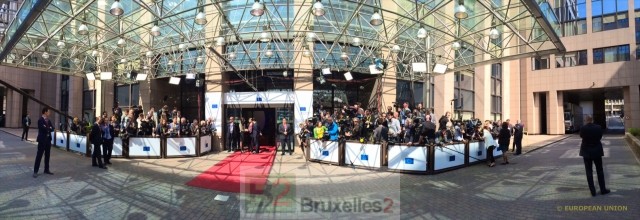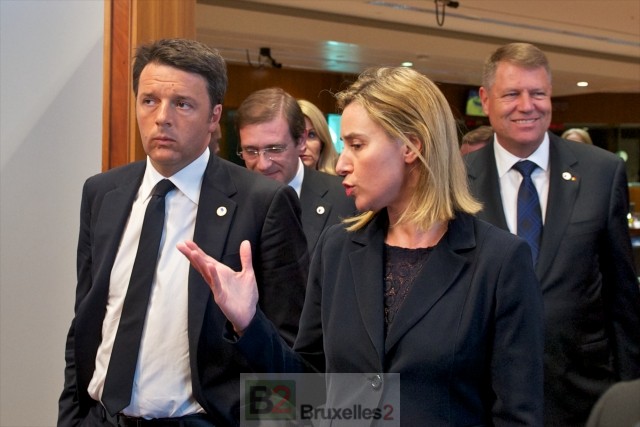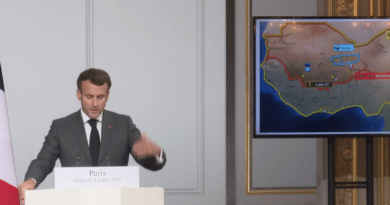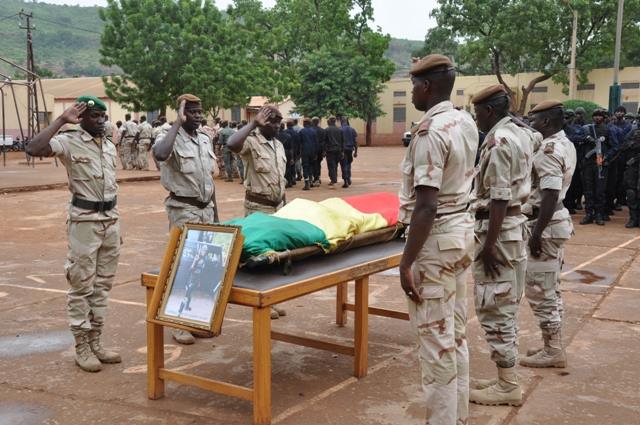A remarkable political tactic. The veil is lifted on EUNAVFOR Med (Maj)

(BRUSSELS2 - Exclusive) The European security operation in the Mediterranean — which we will call by its code name "EUNAVFOR Med" (EUNAVFOR Mediterranea) — is a small masterpiece of preparation, political and operational in fact. Narrative. And first elements of an operation which is not yet launched.
A remarkable political tactic
The charge of the Pont d'Arcole
On the one hand, political leaders quickly agreed on its necessity. On the other hand, between the political idea and its conceptualization, it will have taken just as little time, 4 weeks, according to our elements, including 2 public holidays (May 1 and May 8 or 9 depending on the country). A beautiful turning maneuver which is almost worthy of Napoleon's lightning offensives, with a smokescreen, intense preparation and a decisive and rapid battering. If I would allow myself an analogy, it is somewhat the charge of the Pont d'Arcole... Thus, between putting this question on the agenda of a Council of Ministers of Foreign Affairs, April 20, and the meeting of May 18 which could give the green light to the operation (concept of crisis management), only a few weeks will have passed.
Mogherini at work
When the shipwreck occurs, on the night of Saturday to Sunday (April 18/19), with 700 to 1000 dead, emotion seizes all of Europe. In the time of inaction (read: Get your head out of the sand!) the time for action seems to have come. The Renzi-Mogherini team knows it's time to go back on the offensive. But, this time, in flash version. The advantage is that the two key posts in Brussels - Foreign Affairs and the Interior - are in the hands of the "Mediterraneans", who are perfectly connoisseurs of the situation. The agenda facilitates the deal. A meeting of Foreign Ministers is already scheduled for 20th April, with Libya on its agenda.
Shaky schedule
The consultation goes quickly. Phones are crackling. Federica Mogherini is in Italy at home and meets the Italian Prime Minister (her former boss). And his counterpart in charge of migration, Dimitris Avramopoulos, who was to visit Ceuta and Mella, together with Interior Minister Jorge Fernández Díaz, canceled his visit but decided to go to Luxembourg. They have the support of Commission President JC Juncker and several capitals. They decide by mutual agreement to meet Ministers of the Interior and Foreign Affairs in Luxembourg (in April - the meetings take place in the Luxembourg capital and not in Brussels). We're shaking up the schedule a bit. And we add a joint session in the afternoon. All the Ministers of Foreign Affairs are there (in person or the Deputy Minister) and more than half of the Ministers of the Interior have made the trip. Which is a challenge in such a short time (barely 24 hours).
A ten-point plan concocted with onions
The two commissioners prepared a ten-point plan, quickly developed, which largely takes up the Italian demands (except for the solidarity distribution of the refugees, the relocation which will remain partial and voluntary (read on the Club: The Commission proposes a 10-point plan to deal with the migration shock in the Mediterranean). This plan is cleverly revealed only as late as possible. Few things leaked in the press, apart from the desire to strengthen Frontex, and a German idea of having a distribution key to distribute the refugees from Syria. The College of Commissioners did not really have time to discuss these points in depth, which were included in part in a communication on migration scheduled for 13 May. And this approval by the Ministers somewhat spoils the process. A spokesman will admit it on the tip of the lips, the following day. " Commissioner Avramopoulos is entitled to announce new leads. But the decision is up to the college. » Too late...

Issue: drive the point home
The second phase already underway
The Council is not yet over and the second phase has already begun: the convening of a European summit, devoted to migration and rescue in the Mediterranean. From 17 p.m., the President of the European Council Donald Tusk announces his convocation. Here too, it is a question of picking up speed, avoiding a last-minute reversal, allowing skeptics to express themselves and the process from getting bogged down. During the weekend, the phones rang between the capitals, between Renzi, Holland, Merkel, Cameron and Tusk in particular (these 4 will also meet for a meeting between "big countries" during the European summit). The terrain was well marked.
British support
The British leader, in the middle of the electoral campaign, knows that he has a double card to play: to show British naval power (which allows the passage to swallow all the criticisms that have been made to him on the reduction of the means of the armies and that always pleases the English attached to the Royal Navy as to the royal family) and take on one of his favorite battle horses: the fight against immigration. Incidentally, the heads of state give him, involuntarily, a little boost in his campaign.
The imprimatur of the "Chefs" obtained without great difficulty
Meeting on April 23, the Heads of State and Government give their "imprimatur", in turn. The discussion was long, especially because everyone wanted to talk. " Multiply 28 speeches by 5 minutes minimum, that's already 2 hours at least explains a regular witness of these meetings. " And since there were a few who were particularly verbose... », in particular Italian or Maltese, « you arrive almost at 3 o'clock ". Add time to review findings. Because, to go faster, the conclusions have been reviewed and corrected, in the room itself. The "pen of the Council" who took note of most of the Chiefs' requests for corrections. Everything is then read to the Chiefs to obtain their approval.
A ten point plan
The ten-point plan is broadly approved, with one or two politically sensitive exceptions – whether or not a refugee resettlement program is mandatory. But the main part of the operational character is retained: reinforcement of the Frontex operation (three times instead of twice proposed), establishment of a CSDP operation, establishment of elements in several key countries (Niger, Tunisia , etc.) to "block" or "monitor" migrants/refugees leaving for Libya. We add an element here and there: consultation with the African Union, with Turkey. But B2 has carefully made the track-list between the draft conclusions and the final draft. And the analysis is clear. (read : Avoid new tragedies in the Mediterranean. European Council measures)
A clever mix to satisfy everyone
This plan is cleverly balanced: a little rescue, a little distribution of refugees/migrants, a little return to sender and above all the fight against traffickers. " There is something to satisfy everyone. Every head of state and government can go home saying: I won. ” tells me an expert in these European games. Finely played! The European Commission has carefully chosen not to play the provocateur. President Jean-Claude-Juncker, a tear in his eye, said he was "disappointed" with the result. It's a bit of a crocodile's tear... The European executive took great care not to upset the 28; in particular, he renounced any desire to propose the opening of the directive on temporary protection (although intended to ensure solidarity between Europeans in the event of a massive arrival of refugees). And his proposal for European "quotas" for legal migration is more part of the "migrations" package presented on May 13 than the discussion of April 23.
Operation planning
Concept builders
The Heads of State and Government have barely finished debating when the planners in the European structures and in the various Defense Ministries (particularly in Italy) have already set to work, as soon as the Council of Foreign Ministers ends In fact. On the double. A first draft of the concept is built in stride. The first comments fuse. And a draft crisis management concept can then be officially presented and discussed by COPS ambassadors who are looking into the issue on May 5 (read details about the Club: Disrupt the “business model” of traffickers. The Mediterranean CSDP operation takes shape). As one of the European diplomats says, we have " rarely been so fast to set up, conceptualize an operation and reach a consensus ". The first feedback from the Member States is, in fact, positive, so positive, that for once, there is very little question of the means available or necessary. This is the usual puzzle of EU military operations.
We wonder, we feel, but we agree
There are quite a few skeptical voices. We feel that some countries, especially in the East are not really super enthusiastic (probably the fear of seeing political attention diverted from the Eastern front). There are the usual questions: should the operation have a humanitarian aim (the rescue of refugees) or mainly to fight against traffickers (rescue being the domain of the Italians and Frontex, and the law of the sea covering anyway a general rescue obligation). But the consensus is to continue working and quickly.
Who will participate?
Several States are willing to contribute to the operation (with resources). Even the British! Which is a first for a military operation since the Congo and Artemis (2003) or Bosnia and Althea (2004). According to our information: Italy of course and Malta but also Spain, Germany, France and the United Kingdom should provide the means, even Belgium and/or the Netherlands. In short, most European maritime powers are up for it. And the others will participate with air assets, men and officers, etc. One or two third countries could even possibly participate (Norway for example). It is Italy with Rome which should offer its headquarters. And one or two admirals are already "arrowed" to command the operation. But shh... nothing is official (read about the Club: A maritime operation to fight traffickers. First elements).
The political and legal difficulty
Everyone knows in fact that the real difficulty is... both legal and political. We must manage to have an international consensus, in order to obtain a UN resolution, at the very least, in order to be able to continue to preserve the European consensus. Italy - which is not a member of the Security Council - Spain, France, the United Kingdom which are members (with Lithuania chairing the Council this month) are on hand to prepare and refine a draft resolution. Everyone is activating their contacts to convince the Africans on the one hand, and on the other the two countries with the right of veto, China and Russia. That's fine, again. François Hollande sees Putin in Armenia on Sunday. While Federica Mogherini is in China with the Ministry of Foreign Affairs. And, according to my information, it would be the British who would hold the "pen" to write the draft resolution. Openings are felt...
A EUNAVFOR operation in 3-4 phases
In Brussels, the European planners, fine connoisseurs of these difficulties, have built a concept of operation in 3 - 4 phases, which are as many plans B or C, according to the results obtained in New York, but make it possible to overcome, pretty much all assumptions.
Here are the phases of the operation as they can be briefly presented
1st phase - which can be started immediately - without waiting for the UN resolution - with the approval of European ministers with intelligence and police cooperation. Objective: to collect as much information as possible on the ships, the flags, the networks in question, to file them in order to be able to strike them as accurately as possible, to freeze their financing, etc. then gradually to be able to increase in power, according to the intensity of the resolution.
2nd stage : be able to approach (and seize if necessary) suspicious ships flying either a European flag or not, on the high seas, or even neutralize them (once emptied of their migrants). On this level, it is possible to act, if it is done with tact, according to the law of the sea, without a UN resolution. An option is planned to allow agreements with certain countries (Tunisia, Egypt) which would then authorize under certain conditions the control under the state of their flag.
3nd stage (and 4th phase): these are identical operations but this time with regard to other vessels flying the "Libyan" or "foreign" flag. And an option is provided to enter Libyan territorial waters. This then requires a UN resolution, or even a request from the Libyan government (but which one), or even both.
And now ? Two decision-making meetings
Two appointments are now on the table that will set the level of ambitions: in New York, on May 11. The High Representative has decided to go up to the "Big Apple" to defend the European point of view herself. and in Brussels on May 18, where foreign ministers are expected to approve, if all goes well, the concept of crisis management. The launch of the operation is normally scheduled for June.
First lessons?
1st lesson. Always insist: a yes can survive a series of "no"
Such speed, however, did not come out of nowhere. We can go back 18 months ago, to trace its origins, after the first tragedy in Lampedusa. The Italians, through Emma Bonino (foreign affairs) and Mario Mauro (defense) asked High Representative Catherine Ashton in November for various measures - including the establishment of a naval operation to rescue and fight against traffickers , the strengthening of Frontex, the discussion with third countries on immigration — discussed at the Council of Foreign Affairs and Defense Ministers in November 2013. Options are worked out by European diplomats: military or civilian, and diplomatic (Read about the club: CSDP operation in the Mediterranean: three options under consideration). Italians and Greeks agree to act together, during a meeting between Mario Mauro and Dimitris Avramopoulos (then Defense Minister). But the discussion between ministers will not really succeed. And the summit of heads of state in December 2013 will end without result. The "28" reject the Italian request... Rome and Athens do not give up, however. And they do not miss an opportunity - with the Greeks, Maltese, Spaniards and Bulgarians - to return to the charge to demand more European solidarity. In the diplomatic services, the maritime option will come back on the table when we talk about assistance to Libya.
2nd lesson. Speed is a question of will more than procedure
We have not experienced such enthusiasm and such speed since the establishment of the observer mission in Georgia in 2008, after the Russian coup. But this was a civilian mission, of a fairly limited size (400 people) on such a well-defined territory, facing a well-known "adversary", who had given his prior agreement to the mission . " Even with Artémis in 2003, we hadn't been that fast. At least for now 😉 » tells me an old CSDP regular.
3rd lesson: When European wants, European can
The operation is not yet launched, nor operational. But if it materializes, it will show that, when Europe wants, it can. And above all, she can do it quite quickly, by speeding up the pace and violating the procedures a little. Of course, one can argue that a national state can go faster. But what state can et wants to put today, at a time of increasing crises, budgetary difficulties and other commitments, a dozen or so ships at sea quickly, with naval air assistance, off the coast of Libya?
(Nicolas Gros-Verheyde)


